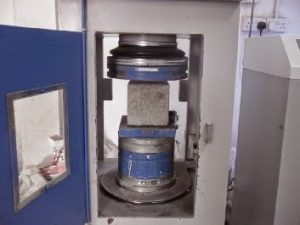IMPORTANT PROPERTIES OF CONCRETE
For a specific type of structure, certain characteristics of concrete to be used may be more important than others. For example, concrete for a multistory building or bridge should have high compressive strength, whereas concrete for a dam should be more durable and watertight whereas strength can be relatively small.
Workability
It is the ease with which concrete can be placed & finished. It is an important property for many applications of concrete. One characteristic of workability is consistency or fluidity which can be measured using slump test. (ASTM C143).
In the slump test, a specimen of concrete mix is placed in a mould shaped as the frustum of a cone, 12 in high, with 8-in diameter at base and 4-in diameter at top. When the mould is lifted up the change in height of specimen is measured. This change in height is taken as the slump value. Higher is the water content larger is the stump value. (Click Here to see complete slump test procedure)
Durability
Concrete should be capable of withstanding the weathering effects, chemical action and should be able to resist load to which it will be subjected in service life. Much of the weather damage sustained by concrete is attributable through freezing and thawing cycles. Resistance of concrete to such damage can be improved by increasing the water tightness.
Water Tightness
It is an important property of concrete that can be improved by reducing the amount of water in the mix. Excess water leaves voids and cavities after evaporation, and if they are interconnected, water can penetrate or pass through the concrete. Prolonged thorough curing as well as entrained-air (minute bubbles) usually increases water tightness. Water tightness can be increased by improving effective compaction of concrete, controlling aggregate grading, using construction chemicals etc.
Strength
This property is usually of main concern. Normally it is determined by knowing the ultimate strength of a specimen in compression tested in the lab but sometimes flexural or tensile capacity is also important which can also be determined through lab tests. Since concrete usually gains strength over a long period, (90 days) the compressive strength at 28 days is commonly used as a measure of this property. Concrete strength is influenced mainly by the water cement ratio, mix proportions and other factors.
Concrete Strength May Be Improved By
- Decreasing water cement (W/C) ratio
- Using higher strength aggregates
- Using well graded aggregate resulting lesser voids
- Proper moist curing of concrete.
- Adding a pozzolanic material, such as fly ash
- Effective compaction of the concrete.
- Suction of excess water with a vacuum from the concrete in the form work.



